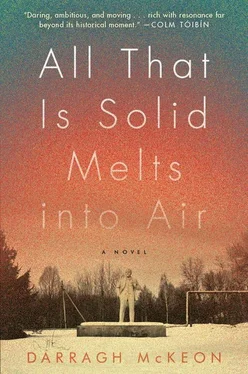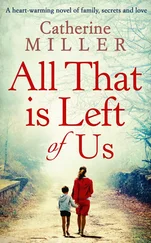“Used to?”
“Yes.”
Mr. Leibniz doesn’t press.
She runs her hands along the marquetry designs on the side, takes pleasure in the feel of the curve; like a hip bone.
“Would you have done things differently, before you were arrested, if you could have those years back?” she asks.
“What could I have done?”
“I don’t know. Surely people put up some kind of resistance.”
“There was no resistance. Resist what? There were no rights or wrongs, no grey areas, there was just the system. I did all I could do, I survived. I’ve lived long enough to take care of my wife. That was my only ambition.”
It’s time to go home. Alina is working late and Maria will need to cook. She takes Mr. Leibniz’s hand. His wife is elsewhere.
“Thank you for speaking with me. I’ll make sure Zhenya doesn’t miss any more practice.”
He senses a change in her, a doubt in her grip. He dips his head, seeking eye contact.
“I speak to you as a man surrounded by forgotten years. The only change for my wife and I will be death. Resistance is for the young. And you, whether you realize it or not, are still young.”
Maria smiles and squeezes his hand, a flush of deference in her cheeks.
In the corridor she looks down at the pools swelling around the mat, solid snow transformed into liquid, trickling down into the stairwell. On the floor below she hears movement and the groan of the irritable step. It fires an image in her mind and she continues the sound in her imagination, boots trampling up the stairs, the arrogant strides of authority pacing their way to this landing, knocking on this door, standing where she is standing. Soldiers filling up the corridor. Mr. Leibniz in his robe, dream-muddled. That feeling of utter helplessness, not a single person to speak out for you, a feeling so strong she could reach out and touch it with her hand.
At half past ten Grigory finishes his shift and makes his way to the cafeteria. The place will be closed, but he has a key. If he hasn’t eaten, they leave a meal for him in the fridge. A tub of mackerel with beetroot and mayonnaise, or sometimes cow’s tongue and roasted turnips. He hardly tastes it, eats it cold. Often he has to concentrate just to lift the fork to his mouth. He rarely uses a knife; the instrument has shed its innocence for him.
First he sees the strip of light below the door. As he nears, he can take in the smell. He recognizes it instantly: zharkoye . One of the other surgeons must have finished as late as he; the nurses and attendants rotate surgeries so their meals are earlier in the evening. He pauses, thinks about turning back for his room; conversation is inevitable. But the smell of onion proves irresistible, the thought of a warm meal so comforting.
He opens the door and sees a woman standing over the cooker. The mother of the boy.
She turns, smiles.
“They said you were almost finished. It’s ready for you.”
The surprise makes him wary.
“How did you get in?”
“One of the nurses.”
“She should have asked permission.”
“From who? No one’s going to deny you a decent meal. They practically kissed my feet when I suggested it.”
“I’m not your responsibility.” He says this and then regrets his words. He can leave his authority back in the surgical ward.
She slides the wooden spoon back into the pot, leans against the counter facing him. She speaks slowly, gently, aware of his tiredness. Perhaps it’s the light, but he seems even paler than those few days before.
“I understand. I’m not here to mother you. I’m here to thank you. It’s a celebratory meal.”
“What are we celebrating?”
“My Sofya is getting better. She has been in bed with a temperature, diarrhoea, having trouble holding down food. Of course I thought the worst. But they did some tests and she’s a lot healthier, eating her food, colour back in her cheeks again. It turns out it was only an intestinal infection. It feels as if she has been brought back to life.”
Grigory runs his hand through his hair. He’s still not sure he wants to discuss someone else’s situation. Even if they have good news.
“And we’re celebrating the return of my Artyom. That dog has brought him back to me again. He’s talking again, telling me things. That crippled dog has helped more than you know.”
Grigory nods, relenting, and slumps into a chair.
She serves him and they eat without speaking. The beef and garlic steams up into his face and he drags down the smell and eats heartily. When he finishes she fills his plate again. She waves her finger before he can refuse. “We have enough. It’s a celebration, remember.” She watches him eat, a satisfied smile on her face.
Now that he can look at her, properly consider her, he sees lines of worry etched into her forehead and around her mouth. But her smile is a flare of crooked teeth, a burst of energy and light.
When he finishes she pushes aside the plate, takes a bottle from one of the cupboards, and fills his glass.
“I shouldn’t.”
“None of us should.”
She dips a finger in her glass, then kisses her fingers and flicks a few drops of vodka on the floor. They drink and crack their glasses down.
She puts an elbow on the table and rests her chin on her palm.
“Tell me why you are here.”
This woman can change the tone of the room in an instant. Her manner is both open and direct. Not aggressive, simply without triviality. He puts his two hands flat on the tabletop, tucks his thumbs underneath, settles himself, and thinks about his reply.
“Well, my superior at the hospital recommended me to an advisor at the Ministry of Fuel and Energy. I was sent to Chernobyl, and then they transferred me to a resettlement camp.”
“That’s not why , that’s how , but no matter, we’ll get to it.”
“What about you? Did you come from Pripyat?”
“We lived in the Gomel region. A small village near the plant, obviously. But I’m from Moscow originally, like you.”
“Artyom told you?”
“Don’t worry, we all know about you. Silence is no defence around here.”
He doesn’t test her statement, doesn’t want to know. Grigory takes the bottle and pours both of them another glass.
“How did you end up in Gomel?”
“I fell in love.”
A meandering smile on her mouth.
“Did he… your husband…”
The words came stuttering out. Without his white coat, he is lost with such a topic. He has no idea how to discuss such things outside the realm of professional expertise.
“Yes. He died before they moved us to this camp. He worked as a liquidator for the plant. They gave him the job of cutting down the neighbouring forests.”
“I’m sorry.”
A pause.
“Thank you.”
He considers changing the subject, but there is no other subject here.
“How did you meet him?”
She thinks about her reply. She’d like to describe it all to someone. Why not this doctor? She hasn’t had a chance to relive it in a story. The day Andrei walked into the tailor’s workshop near Izmaylovsky Park and was introduced to the assistant, who was chalking up some suit material for cutting. Pins clamped in her teeth, her jaw clenched in concentration. She looked up at him in acknowledgement, and immediately his blue eyes were the only colour in the room, eyes as resonant as a lingering piano note. She stopped what she was doing to look, and he looked back at her. She took in the way he stood, feet planted on the floor, shoulders back, a man who knew the world, who was equal to its vigour. She slid the pins from her mouth and had to make her apologies and leave, confused. She walked for hours that afternoon, trying to locate the sensation within herself, but she couldn’t read her own feelings, they were new to her, and it was only later that she realized it was the elusive sensation of love that had crept up on her unawares, a sensation for which she had no reference point. And when the thought began to develop into realization, her inclination was to dismiss it: such things are the preserve of adolescents, not someone as old as she. She told herself she is someone who knows the hardness of the world, who understands that to survive is to nurture the practical, to keep steady and quiet and choose things based upon their value.
Читать дальше












